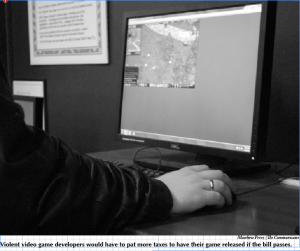 Matthew Perez
Matthew Perez
The Communicator
The potential tax credit for video game developers of non-violent games could effect future of game development.
The ways and means committees executive summary of their tax reform act of 2014 says they would want to reduce the entire tax code by 25% , according to the committees website.
This would include repealing deductions for adoption expenses, and deductions on electric cars. The reform will also change who is eligible for a research and development tax credit.
The R and D tax credit is a tax deduction which makes it easier and more profitable for companies to innovate new technologies according to IPC’s website, an organization of electronics manufacturers.
So that means if a developer makes a violent video game they pay more taxes for all of their operations that could have been deductible under the R and D credit.
Most gamers seem to think the move wouldn’t do much to decrease the number of violent video games on the market.
SFCC Gamer Club member Kevin Cao said that it doesn’t make sense to try and punish violence in video games as if it were worse than in other media. “First off define what is and what isnt violence” said Cao. In a video game you control the violence and are making the decisions where as “in a book you’re just a passive observer” said Cao.
It may be that our conscience is more involved in the violence in games, but they are commonly accused of pointless violence, which maybe what the Ways and Means committee is attempting to address.
Jared Mcshane, another member of the SFCC Gamers Club argued that games provide an outlet for stress and that if someone is bringing anger out of a game that “just means it wasn’t a successful outlet.”
Indie (independent) developers have less capital to work with than larger game developers, so it might be more important to them said Gamer Brad Hargrave.
But despite this the consensus among the Gamers was that the reform is probably too vague to be effective. “some (games) might get judged more than others and some might get let go, and then you’ll have companies talking to each other going like ‘why did your game get approved and ours didn’t, it doesn’t seem like a very fair system” said Hargrave.

